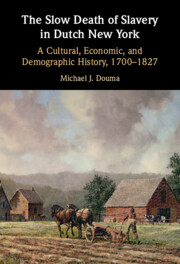 The Slow Death of Slavery in Dutch New York
The Slow Death of Slavery in Dutch New York Published online by Cambridge University Press: 20 December 2024
Chapter 3 establishes that the Dutch had economic incentives to continue holding slaves. Slavery in Dutch New York was not just a cultural choice, but was reinforced by economic considerations. From archival sources and published secondary sources, I have compiled a unique dataset of prices for over 3,350 slaves bought, sold, assessed for value, or advertised for sale in New York and New Jersey. This data has been coded by sex, age, county, price, and type of record, among other categories. It is as far as I know the only slave price database for slaves in the Northern states yet assembled. Regression analysis allows us to compute the average price of Northern slaves over time, the relative price difference between male and female slaves, the price trend relative to known prices in the American South, and other variables such as the price differential between New York City slaves and slaves in other counties in the state. Slave prices in New York and New Jersey appear relatively stable over time, but declined in the nineteenth century. The analysis shows that slaveholders in Dutch New York were motivated by profit, and they sought strength and youth in purchasing slaves.
To save this book to your Kindle, first ensure no-reply@cambridge.org is added to your Approved Personal Document E-mail List under your Personal Document Settings on the Manage Your Content and Devices page of your Amazon account. Then enter the ‘name’ part of your Kindle email address below. Find out more about saving to your Kindle.
Note you can select to save to either the @free.kindle.com or @kindle.com variations. ‘@free.kindle.com’ emails are free but can only be saved to your device when it is connected to wi-fi. ‘@kindle.com’ emails can be delivered even when you are not connected to wi-fi, but note that service fees apply.
Find out more about the Kindle Personal Document Service.
To save content items to your account, please confirm that you agree to abide by our usage policies. If this is the first time you use this feature, you will be asked to authorise Cambridge Core to connect with your account. Find out more about saving content to Dropbox.
To save content items to your account, please confirm that you agree to abide by our usage policies. If this is the first time you use this feature, you will be asked to authorise Cambridge Core to connect with your account. Find out more about saving content to Google Drive.